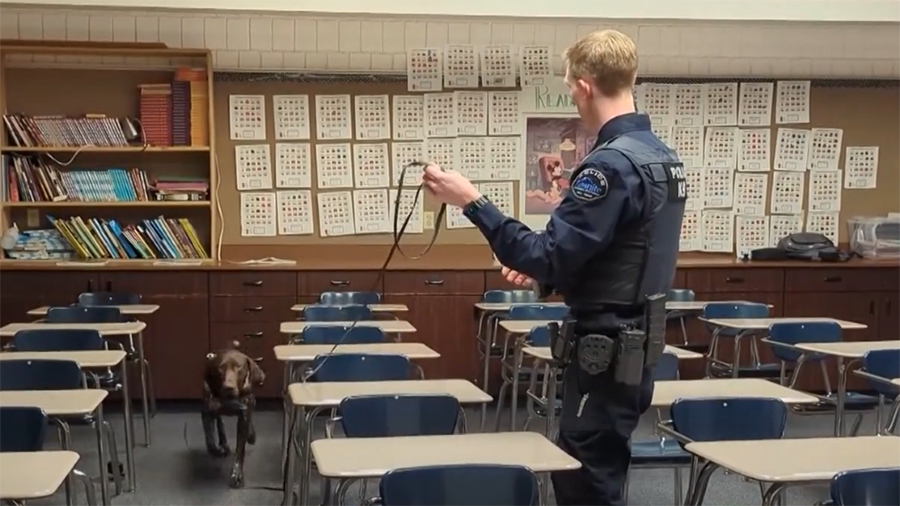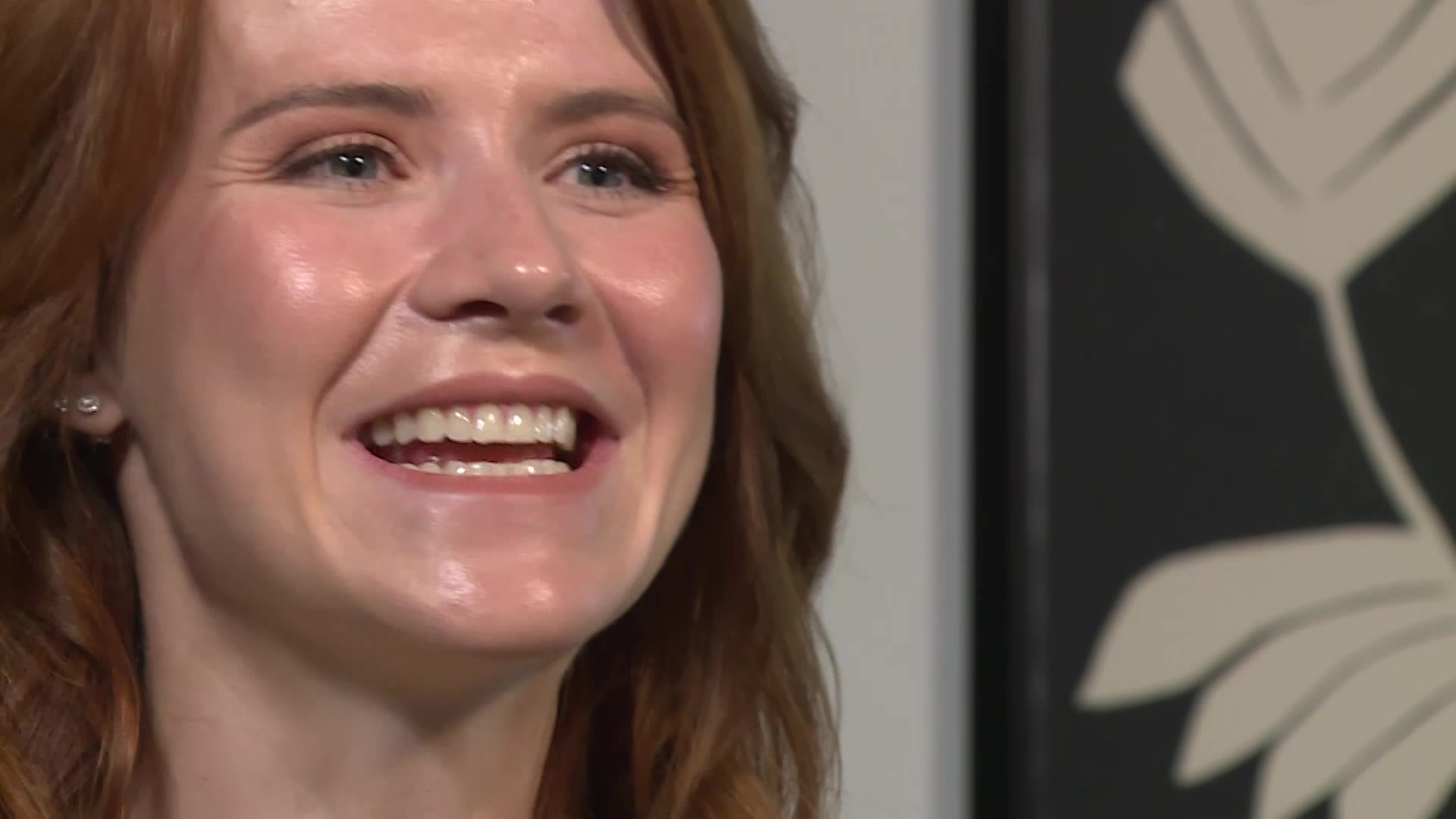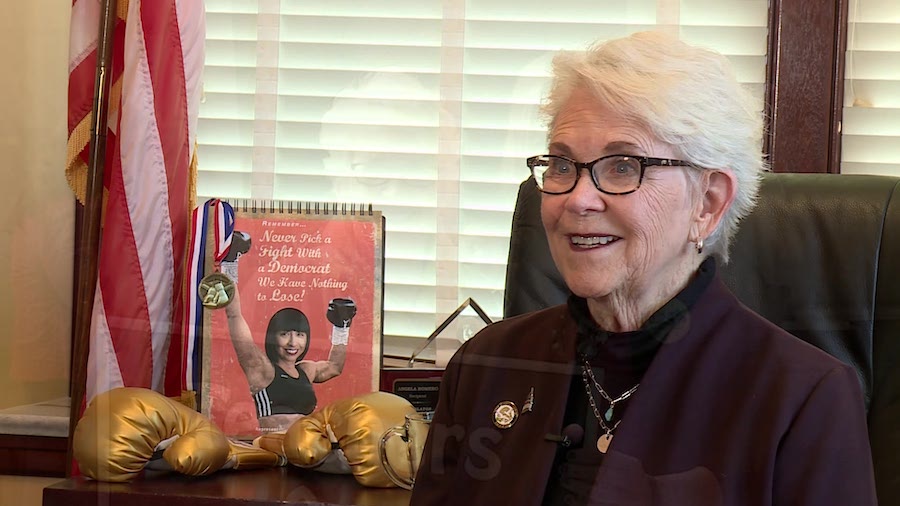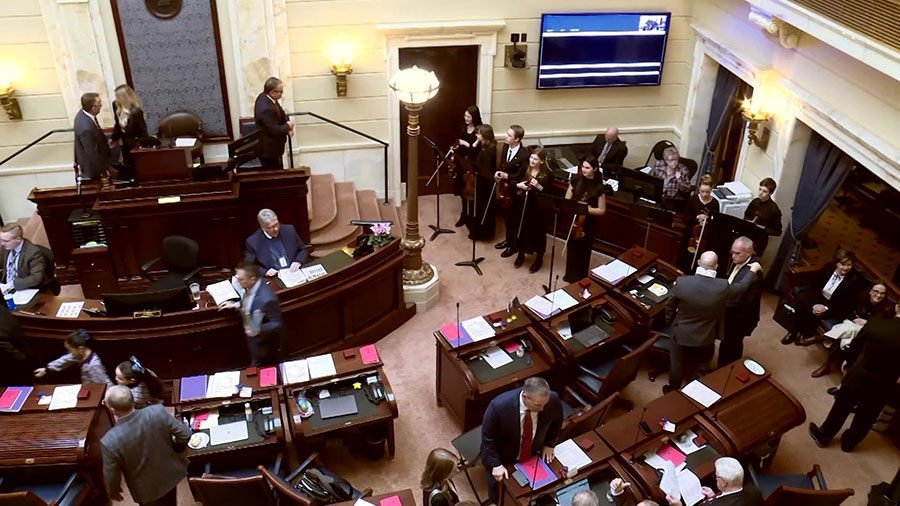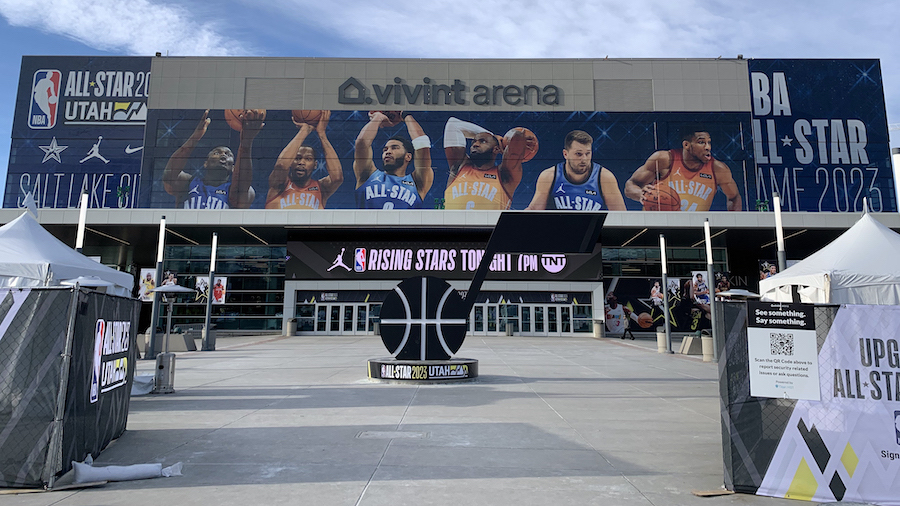KSL+: Growing “true crime” genre impacting Petito case
Sep 28, 2021, 3:00 PM | Updated: Aug 15, 2022, 11:18 am
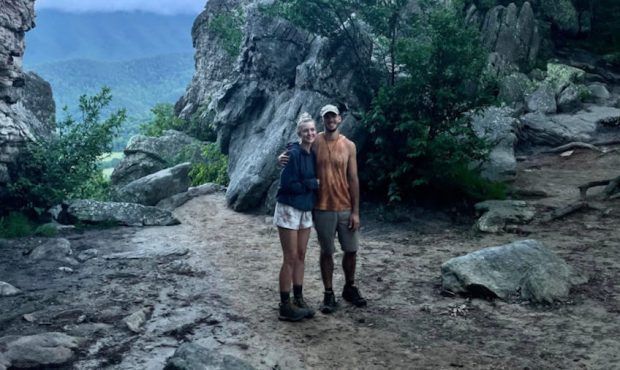
Gabby Petito and Brian Laundrie stand before a feature known as the Dragon's Tooth. Petito posted the image to her account on an app called The Dyrt.
Matt Rascon: Today on KSL+, the search for a missing 22 year old that spanned the country and the one person of interest, her boyfriend, vanishes as police start asking questions. Officials announced this week they discovered the body of Gabby Petito in the Bridger-Teton National Forest, thanks in part to amateurs, and a growing source of investigative material.
I’m Matt Rascon and this is KSL+, and today we’re talking about why this story has grabbed the attention of so many, and how that publicity impacts the investigation.
Before we dive in, let’s get a clear timeline of what we know at the time. We’re recording this Gabby Petito and Brian Laundrie left on a cross country trip from New York over the summer, living in their van and visiting national parks, eventually made their way to Utah. On August 12th, Moab police report they got a call about the couple fighting,
911 operator: Slapping her?
911 caller: Yes, and then we stopped. They ran up and down the sidewalk. The hitter hopped in the car, and they drove.
Matt Rascon: Gabby facetimed with her mom on August 24th. That’s the last time we know of that anyone other than Brian saw her. On August 25th, Gabby publishes her last post on Instagram. And on the 27th her mom says she received an odd text from her that she doesn’t believe she wrote.
By September 1st, Brian is back in Florida alone but with Gabby’s van. Her family reports are missing on the 11th. Brian’s parents claim he left on the 14th and hasn’t been seen since. And on September 19th, authorities find Gabby’s body.
The case grabbed people’s attention from the time she was reported missing, speculating on Reddit, TikTok, even diving into all of Gabby’s social media accounts, including her Spotify, and while much is said about how detrimental this kind of speculation can be.
Youtuber: It’s kind of wild like it’s, like insane a little bit because we drove past. We actually weren’t able to find any…
Matt Rascon: Among the tips that poured in, a YouTube video showing Gabby’s van, helped authorities know where to look to find her.
The true crime genre originated with Truman Capote in the 60s he wrote about a quadruple murder in Kansas, immersing himself in the community and writing the story like a novel, but it was true. We’ve seen plenty of amateurs crack cases that evaded police. A recent Netflix documentary highlighted internet sleuths who figured out who was posting disturbing videos abusing cats online.
Caleb Shumway: It’s rugged. It’s lots of sandstone.
Matt Rascon: Even in Utah, 23 year old UVU student Caleb Shumway discovered the remains of Lance Leeroy Arellano.
Caleb Shumway: I specifically went looking for the remains of Arellano…
Matt Rascon: …who was wanted for shooting a park ranger. So one of these armchair detectives helpful and when are they hurtful? And why do some cases attract so much attention, while others get nothing?
Chris Bertram: Every class starts with this discussion, whether it’s my criminal law class or investigations class, a criminal justice introduction class, every class is started with updates to that case, the students ask questions, you know, just as you are.
Matt Rascon: I sat down with retired Unified Police deputy chief Chris Bertram to talk about it from the perspective of law enforcement. What are some of the elements of this case, the details that maybe make it stand out?
Chris Bertram: You know, I noticed when I saw this on the news feed the Sunday night when it was reported. I picked it up on some news feed I’m not sure who’s but you know, it was unique to me, to me, there was, you know, the case immediately jumped out as something unique. In fact, I went to my class the following Monday, Monday morning, taught my investigations class and psychology criminal behavior class, I said, watch this case, it’s going to get big, it’s going to be a national case. Because I think there were a lot of unique elements to this. This is a couple that was engaged. They were, you know, going around the country, especially in the West and living that van life that I think a lot of people are following. They may not actually be doing it, but it’s a unique life of living out of a van, you know, kind of a minimalist lifestyle. You know, and I think people are, you know, in this time of quarantine, and this time of, you know, unrest, I think people are kind of, you know, living through other people sometimes in these videos and they make you feel good. They’re out in nature and they’re, you know, living, you know, kind of just a simple lifestyle. Also in the fact that, you know, this individual was now back in Florida, and there wasn’t anything said, I think that, you know, he was back with his parents and that, you know, Gabby’s parents didn’t know where she was she was missing. I think there was just a lot of unique qualities to this case that picked up nationally. That I think the people, you know, in the United States, I think, just really kind of grabbed on to it.
Matt Rascon: Yeah, I assume that, you know, that multi state, you know, a lot of local news in different areas covering it?
Chris Bertram: Well, I would add, not only that, that one of the other things that was interesting was it went out to the west coast, I mean, went to California, and then back through there to Southern Utah, and then up to Wyoming where it kind of ends, but it doesn’t end because then it goes across the country back to, you know, Florida. And so, I think that as a country, you’re looking at that and thinking, I wonder if I came across those people. I wonder if in somewhere somehow Kansas, you know, Utah, you know, Nevada, California, did I come across those people. And I think that that kind of intrigued people to, you know, to keep looking, you know, and wanting to know more. And this is at least when we start with this so we can half ago, this is kind of a who done it, you know, what’s going on, we don’t know any facts, we want to know the facts, we want to, you know, start to pick this apart. And I think that a lot of people, you know, as this hits the media, they start to dive in, you know, from their armchair investigator, and want to start figuring out what happened. It’s putting puzzle pieces together. And as we found out the public actually gave us, you know, gave law enforcement, a lot of the information that may have helped them from the investigative side of things.
Matt Rascon: How helpful is it for there to be so many voices and people following this case, and talking about it on social media?
Chris Bertram: You know, that it is always nice when you have you know, public input, especially if there are missing pieces that we don’t know about, however, that the noise, the amount of information coming in, really can confuse investigators. And that’s that the advantage that they had, in this case. If this was a small police department, with only a handful of investigators looking at it, it’s very overwhelming, because you’re gonna miss stuff. However, they have, you know, the strength of the FBI, they have multiple police departments that are vetting these leads. And so, in cases like that, no lead goes unchecked. And that’s, that’s an advantage. That means that, you know, things shouldn’t get missed in most cases. And I think that that’s, you know, not only not only does it not get missed, but we have social media, so people talk to the FBI or talk to local law enforcement. And then they went and posted this stuff online. And so now it really gets out there. So law enforcement has to pay attention to it. And you know, I think there were some good things, as I said, but but there was probably things that were distracting or, you know, weren’t necessarily involved in the investigation, and you have to quickly investigate that and quickly dismiss it or follow up on it.
Matt Rascon: Yeah, maybe let’s talk about that a little bit more. When does the attention from the public go too far, and maybe even get in the way of the investigation?
Chris Bertram: My opinion is that it, it really never does happen if you have the right amount of resources there. Where I see it becoming overwhelming is if this is a smaller police department that can’t dedicate or doesn’t have the resources to follow up, to accept the leads in, to quickly vet them and get them out to investigators appropriately. They haven’t maybe asked for assistance of those bigger agencies, or those agencies, like the FBI or the marshal’s office that can help you get out in the field as quickly as possible and follow up on those leads. That’s where it becomes overwhelming. In a case like this, we have to expect that we’re going to get a lot of help from the public. Whether that help is actually helpful, you know, is to be determined by the investigators. Is it going to be overwhelming? Absolutely. And so I think that you have to have the resources in place. And if you don’t have them in the particular department, you have to reach out to your law enforcement partners at the county at the state and especially at the federal level, to help get the right amount of resources in there. And make sure that all leads are vetted because, you know, as my dad is an FBI agent said, you know, he was back in the 70s when a bank robbery would occur in LA, and they went knocked on 100 doors around the bank to see if somebody saw something. And most of the time nobody saw anything but one out of 100 times. There was a red car parked in front of my house with this description of a person I remember it had out of state place and that’s The lead, that brings you to close the case. And I think that’s very important that you have to know as I say this often, you have to scorch the earth, you have to go after everything.
Matt Rascon: Lastly, there has been some criticism with how much attention this has gotten. I mean, there’s blame being put on the media, some people saying, you know, this is this is about race, you know, other people will go missing of a different race don’t get this kind of attention.
Chris Bertram: You know, I think that there are cases of missing people all over the country that come up daily, and they don’t get the same amount of, you know, media or public attention. I think with social media, there’s more going out. I talk about this quite often, in my criminal justice classes, and in other forums is that I think within the criminal justice system in in the United States, we have the best in the world, as I teach kids that are immigrants from, you know, countries in the Middle East and in, you know, South America, in some of these other places, we compare the criminal justice system, so we definitely have the best in the world. It’s not perfect, though, there are gaps. And I, you know, I say regularly that I believe that three things will give you an advantage or a disadvantage in the criminal justice system in this order, education, money, and race. And if you possess all three, or don’t possess all three, they can work to your advantage, your disadvantage. I worked for victims quite often where you know, victims have hired an attorney, and they want an investigator to advocate for them, you know, typically that I start with the education to understand that if you are well educated, you understand how the criminal justice system works, both as a victim or as a suspect, you have an advantage there, because you know, how it works, you know, the buttons to push, the buttons not to push, and how to engage so that you can get the most out of the criminal justice system. And I say that as a victim, or as a suspect, if you have money, you have the ability to hire the right people. You know, whether it’s attorneys, or investigators or advocates or public relations people, you have that advantage. Now, if you don’t, that it puts you at a disadvantage. And as I end up with, you know, as a minority, you are at a disadvantage. If you are a minority in this country, and you are a victim of a crime, that is a disadvantage to you in the criminal justice system, if you are a suspect, that is a disadvantage. If you add all three or two of those together, it just it tears you at an advantage or a disadvantage. And it’s not that, you know, when I when I look at criminal justice cases, I’ve seen this firsthand on both sides in law enforcement. And now especially in the last six years, working for victims, working for criminal defendants, working for people that are in the criminal justice system, and seeing which ones have it better, which ones have an advantage. And I see that firsthand, a lot. And so you know, as I look at a case like this, I don’t necessarily I think that race, you know, education, money may play into that. But I also believe, as I said, early on this case was unique. And I think it drew people’s attention. And unfortunately, not all cases are unique. Not all cases are properly investigated by law enforcement and, you know, are where they drive an investigation, the police department drives an investigation. It’s unfortunate when a person goes missing and law enforcement immediately takes the shortcut and says they’re a runaway, or that’s an adult and they wanted to go missing. We’ve seen that in cases here in Utah quite often where, you know, somebody is reported, and they say, they’re just a runaway. And then later on, you know, it’s a case like Kiplyn Davis out of you know, Spanish fork, that’s not the case, or, you know, where we had the University of Utah student in the first few days, well, she’s an adult, she can go missing and later, you know, his her friends are really, you know, yelling at the top, that this is unusual, and we need to look for her. And then you know, things start to ramp up, you know, a few days later or a week later, or weeks later months later. And later in some cases. And that’s just an advantage. I think it goes to the fact that some people can advocate better for the for people that are missing, and others again, may not know those channels to get it to the media, or to get it on social media or to get the attention because of you know, uniqueness that people will pay attention, including law enforcement, and that’s sometimes frustrating, you know, that sometimes you can’t even get law enforcement to focus on it. And if law enforcement isn’t focused that this is a serious situation or a serious missing person, at least initially, then the media is not necessarily interested social media. The public may not be as interested versus somebody you know, getting law enforcement The FBI other people’s attention and saying that this person is missing, we really need to find them.
I’ll tell you the discussions coming up with regards to race, I think is a good discussion at some point. I think it’s coming up necessarily at the right time. I’m glad it didn’t come up at the beginning, because then it would have distracted but it is a, you know, I think it’s a continual conversation within criminal justice as to how can we do things better? Because when we talk about, especially, you know, you know, minorities or Native American women, you know, children that have gone missing, and there’s less attention. I, you know, I think that’s just a tragedy. Because, you know, I, as I, as I work as a victim’s advocate, occasionally for attorneys, it’s, it’s frustrating when you go and try to get more attention to it, and it’s just not there. It’s frustrating. I mean, really frustrating, especially if you’re dealing with, say, a police department or a law enforcement agency that may not be equipped or has the capacity to properly investigate a case like that, whether it’s a death investigation or a, you know, a missing persons investigation, and things are sometimes missed, or they just don’t have the time, energy capacity to work on it. And, and things then get left out in the cold literally.
Matt Rascon: We’ve also seen journalists crack the case, most notably Michelle McNamara, who discovered who the Golden State Killer is. KSL NewsRadio’s Dave Callie’s COLD podcast took off when he dove into the Susan Powell case, he has since started investigating other cold cases in Utah.
Dave Cawley: In 2009. As part of my work as a journalist, I covered the disappearance of Susan Powell from West Valley, Utah. And that case in 2013, went cold. And the West Valley City Police Department at that time released a copy of their case files in the Susan Powell disappearance. And this was a high profile case that had been covered internationally. And I started going through those records, learning things about the case that had not been previously disclosed. And in 2015, 2016, went to our news director at KSL News Radio and said, there’s so much story here that hasn’t been told. And to do it right, we’re going to need to take our time. So that became the cold podcast, I spent the better part of three years investigating basically re investigating the Susan Powell case and putting my findings together into that podcast. And after that podcast went out. It did really well. People seem to have really connected with Susan Powell through that. And KSL then told me Okay, well, now you get to do it. Again, your full time job is to basically investigate these cases, we’ll look at, you know, one case each season. So we did a second season of cold looking at a no body homicide case. And that was the 1985 disappearance of Joyce Yost. Along the way I have essentially found myself kind of in that pool of true crime, presenters, journalists podcasters. And in specific reference to Gabby Petito. It was a person close to her family who reached out to me just a short time after the family discovered they had been missing before it was all over the national news. And she had listened to both season one and Season Two of cold and in her message to me, she said I don’t know where to turn. I’m throwing this Hail Mary to you hoping that you can help because Gabby and her fiance, Brian Laundrie were last seen in or around Utah, or maybe Wyoming. And we don’t know anything about the area, we don’t know where to begin looking help. And so I working for KSL news, radio KSL TV, talk to our assignment desk, gave them that information. And that’s where we essentially started gearing up in our own coverage of Gabby Petito’s case.
Members of the public are at this stage of an investigation where police are actively, you know, seeking individuals, they’re gathering tips and going out and vetting those tips. We’re very much on the outside looking in. And the one thing that I learned looking at the Susan Powell cases, we don’t always know what is happening behind the scenes of a police investigation. We can make some reasonable inferences based on what police are publicly telling us right when they tell us that a person like Brian Laundrie is a person of interest. What does that mean? Well, it means that that that’s somebody they’re focusing on. But if we step back and we look at the Susan Powell case, the West Valley City Police Department was calling Josh Powell a person of interest publicly while in their court filings that were not public at the time, they were calling him a suspect. So and the police don’t have to necessarily tell the public at this stage of investigation anything. They’re giving us the pieces that are useful to their investigation. We won’t know what’s actually happening behind the scenes, either until this case ends up in the criminal justice system, or it reaches a point where it’s advantageous for the police to release that information publicly. I think we can expect that the officers who are investigating the disappearance of Gabby Petito have gone to great lengths to go after things like phone records, social media accounts, financial records, all of these are very useful tools for the investigator to be able to start piecing together locations and timeline, figuring out a network of contacts, who was Gabby talking to who was Brian talking to on those phones, you reach out to those people and build that that picture that bigger case, we publicly we don’t have the benefit of that information. And so as the social media machine spins up on a case like this, where we’re sharing those sightings, we’re not always going to be able to tell what is valid, what’s not valid? What if the police vetted? What have they seen? What have they not seen? It’s usually safe to assume they’re getting those tips. And even if they’re not telling us they’re doing the job of going out and attempting to determine what is valid, what’s not valid.
The rise of the Internet sleuth is a pretty fascinating phenomenon. I definitely can’t say that I’m not part of it, right? Because I’m not a trained law enforcement investigator. I’m an investigative journalist. And so I approach an investigation maybe a little bit differently than a police officer would I’m generally looking for stories or, you know, if you’re just a general person in the public, and you have an interest in a case, there’s certainly nothing to stop you from trying to put those pieces together. And I think you see law enforcement agencies sometime, yeah, they reach the end of their road. And they’ll throw that out to the public and say, Look, we need help, we need people with different perspectives or ideas to come forward cases can be solved that way. In my professional experience, I have been in the position of looking at some cold cases from the 80s. And I can tell you that the way we collectively as a community talked about missing persons, or you know, potential homicide cases back in the 80s is very different than today. The tools are different. Certainly, on the police side, forensics have advanced a lot. But on the public side, we have the opportunity to share information, nationally or even internationally, in the matter of an instant. And so a photo a sighting of somebody can go like wildfire. I think the difficult thing, when you look at members of the public going out and trying to solve cases, we don’t often have the training or the knowledge to know how to determine fact versus fiction. And in high profile cases, especially I think we’ve seen this with a Gabby Petito case, there tend to be a lot of claims that fly up and they gain a lot of traction, because it sounds like a good story. But unless the person who’s piecing that together does the job of going back and saying, okay, where did that information come from? Is this a credible source, it can take you down the wrong path. And I think it actually can end up doing harm to investigations when it leads to tips that take investigators in different directions away from where they need to be looking, it’s critically important for me as a journalist to consider the ethics of any information I put out there. I’m a big believer in the idea of freedom of information, and that we shouldn’t lock information up. But at the same time, we have to craft the balance, right, you need to protect people’s personal privacy, just a general member of the public. As a journalist, I don’t want to be in a position of publishing their telephone number or their home address, especially if they’re, you know, the subject of an investigation or they’re a potential witness. And they might be badgered, for instance, by members of the public. So it’s constantly weighing that, specifically when you start talking about victims and victims families, there can be real damage done. And I think particularly when you have say survivors of domestic assault or domestic abuse of other forms, if you go out and you broadcast their personal information without their consent to a wide audience, you know, potentially international audience, you are opening that person up to all kinds of attention they might not want and so you have to balance is there a compelling need for the public to have this information? Does it help people better understand high profile case or event? And then weigh that against is there potential damage to the individual in this case, and that’s constantly a teeter totter that I think those of us who work in media or who investigate cases, you know, have to try to find that balance. And sometimes where we run into conflict with members of law enforcement is, we might have different perspectives on where that balancing line is, an investigator will often want to keep their information very tightly shielded, because the A, they want to protect their victims, but be they also want to protect the integrity of their investigation and releasing some of that information out publicly can actually do harm. We in the media, oftentimes, it’s our job to dig for those facts. And we might come across information or get information that a member of law enforcement working a case wouldn’t want us to release. And so we have to make those decisions independent of law enforcement, if there is a compelling public need to put that out there. I think it’s just a, it’s a constant thing to keep in mind. And for those people who are, they are spinning out theories on the web, or they’re, you know, posting their opinions about a case. It’s worth remembering that this is not fiction, this is not television, you are potentially throwing things out there that are going to hurt people who, quite frankly, they don’t care about your opinion. They don’t need to know what you think about their missing or potentially murdered loved one, right? So I think keeping that humanity in mind, remembering the people who are affected is critically important.
I’ve learned a lot from looking at the cases that I’ve covered, and speaking to people who do have a lot more experience. The one thing that is constantly repeated to me is that look, it’s it’s not important. Why a person who was being abused decided to stay in that abusive relationship. It’s complicated. The important things are understanding that we have a role to play in expressing belief for victims, for not blaming victims for being in those abusive situations. And even these of the word victims sometimes can be troubling, right? Oftentimes, we’ll talk about survivors of domestic abuse or domestic violence, as opposed to victims because it when you apply that label of victim on a person, you’re heaping upon them a whole host of assumptions. You know, with the Gabby Petito and Brian Laundrie situation, we had this rare look into a moment in their relationship, when they had this encounter with a police down in Moab, somebody who saw something concerning and called policing, I think there might be a domestic violence situation here, and then watching the way these two individuals interacted with law enforcement. We can certainly try to learn from that. But it does no good to anybody to ask why a 22 year old young woman who is living out of a vehicle with a man who very may well have been we don’t know, but may well have been exerting an abusive control over her life in that environment. Why she couldn’t leave. I think if you look at that, on the on the just this the circumstances that we know where she’s supposed to go, right, so don’t be so quick to judge. Certainly look at the larger picture. And the most important question that keeps coming back for me when I look at these cases is not questioning why a person who was being abused stayed in a situation but instead asking, why is the person who is committing that abuse, feeling like they have carte blanche to do this, as I’ve looked at the Gabby Petito and Brian Laundrie situation, I keep just coming back to some of these parallels with cases that we’ve seen in the past. For me, particularly that comes back to Josh and Susan Powell. And while it’s very early to say what might have happened to precipitate Gabby Petito’s likely death, I think we can hear some of those echoes in this story. And, you know, publicly I think it’s healthy for us to reflect about why did this story grab so many of us so quickly? And have we done as journalists and as members of the public a good enough job in not only clamoring for all of those, you know, leads and details but also stopping to reflect upon? What is the larger situation here? Are we seeing another case of domestic abuse that ended in death that could have been prevented if so, Where were those inflection points and I think that’s where I would like to take the reporting of this case going forward.

